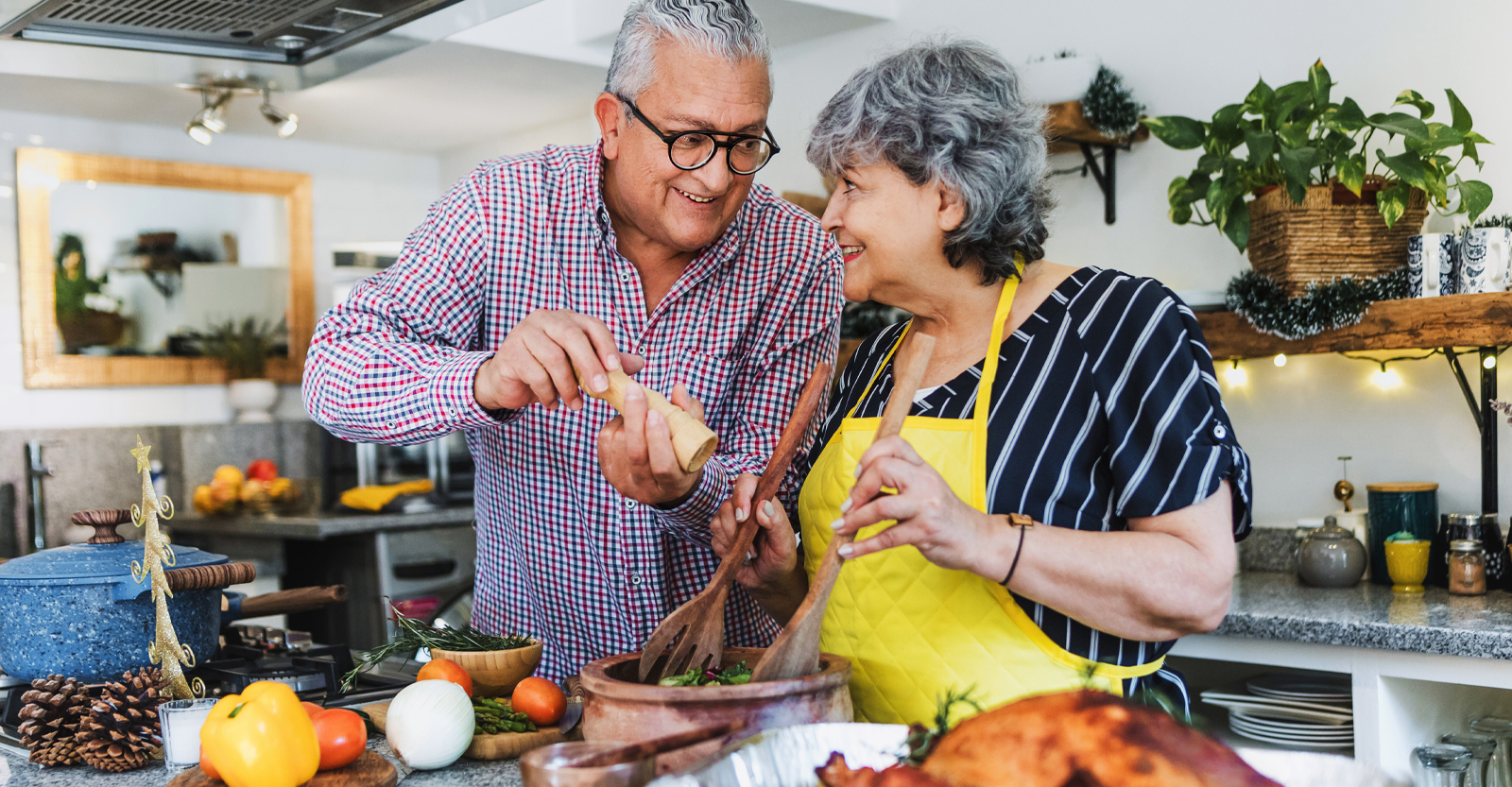
Holiday Safety Tips for a Safe and Joyful Season
November 6, 2024 — Homeowner insights
Nothing embodies the holiday spirit quite like preparing traditional dishes and festive holiday decorations, but these seasonal activities bring a higher risk of accidents. By keeping a few safety tips in mind, you can enjoy the festive fun without worry.
Thanksgiving is the peak day for cooking fires, with an average of 1,600 occurring—more than three times the daily average of cooking fires, according to the US Consumer Product Safety Commission (CPSC). And each day during the holiday season, about 160 decorating-related injuries occur, with over 40% of the incidents involving falls.1
When safety risks increase, taking extra precautions can make all the difference. Whether you’re looking for Thanksgiving holiday safety tips or Christmas holiday safety tips, or want to ensure your homeowners insurance can help protect you during the holidays, we’ve got you covered. Keep the holidays safe and joyful with our top holiday season safety tips for safeguarding your home and family.
Preventing Holiday Fires
Holiday Lights
- Inspect holiday lights for damaged wires or broken sockets before use.
- Avoid overloading electrical outlets with lights.
- Use certified, tested lights for indoor or outdoor use as appropriate.
- Turn off all decorations when leaving the house or sleeping to prevent overheating.
- Installing a smart sensor like, Ting, can add an additional layer of protection by identifying electrical hazards before they become a serious risk to your home.
Christmas Trees
- Keep live trees well-watered to reduce the risk of fire from dried-out branches.
- Place your tree away from heat sources, such as fireplaces, heaters, and radiators.
- Dispose of dried-out trees promptly after the holidays.
Candles
- Consider using battery-operated LED candles as a safer alternative.
- Never leave candles unattended.
- Avoid placing candles near flammable objects or in reach of children or pets.
- Use candle holders that won’t tip over and place them on stable, heat-resistant surfaces.
- Extinguish candles before going to bed or leaving the house.
Fireplaces/Heaters
- Schedule a professional inspection for furnaces, boilers, fireplaces, and chimneys to ensure safe and efficient operation.
- Make certain all carbon monoxide detectors and smoke alarms are functioning.
- Use a screen in front of fireplaces to catch embers and sparks.
- Keep flammable items at least three feet away from fireplaces, space heaters, and radiators.
- Never use an extension cord for a space heater; select models with automatic shut-off features and don’t leave them unattended.
Holiday Cooking: Staying Safe in the Kitchen
- Stay in the kitchen while cooking—unattended food is a leading cause of kitchen fires.
- Keep dish towels, oven mitts, paper towels, and other flammable items away from heat sources.
- Always turn pot handles toward the back of the stove to prevent children from grabbing them.
- Use timers when baking or roasting to prevent food from burning, reducing the risk of fire.
- Have a fire extinguisher in or near the kitchen, and ensure you know how to use it.
- Never pour water on a grease fire. Smother the flames by covering the pan with a lid or using a fire extinguisher specifically designed for grease fires.
- Follow all manufacturer instructions when using appliances, such as deep fryers, air fryers, and slow cookers, to avoid accidents.
Taking Extra Home Security Measures
- Avoid posting travel plans on social media until you return home to prevent tipping off burglars.
- Ask a trusted neighbor or friend to check in on your home regularly, collect mail, and take out the trash to make it appear lived-in.
- Set timers for lights inside and outside your home to maintain the illusion that someone is home.
- Double-check that all doors and windows are locked before you leave, and use deadbolts or additional locks if available.
- Pause mail and newspaper delivery to prevent visible buildup outside your home, signaling you’re away.
- Keep valuables out of sight, either from windows or glass doors.
- Avoid leaving spare keys hidden outside.
Smart Devices
- Install smart security cameras to monitor your home and suspicious activity.
- Use smart door locks to control entry to your home, even when you’re away.
- Set up smart lighting systems to turn lights on and off at random intervals, mimicking occupancy.
- Utilize a smart doorbell with video capability to monitor and respond to visitors in real-time, even if you’re not home.
- Ensure smart speakers or voice assistants are not overly sensitive or accessible to strangers outside your home.
- Enable multi-factor authentication (MFA) on all smart home devices or home security systems to prevent hacking or unauthorized access.
- Regularly update software and firmware on smart devices to protect against potential security vulnerabilities.
Giving the Gift of Safety
- Select gifts suitable for the child’s age, skills, and developmental level.
- Select toys with secured battery compartments to prevent children from accessing and swallowing batteries.
- Avoid toys with small magnets, as swallowing magnets can cause serious injuries.
- For bikes, scooters, or ride-on toys, include safety gear like helmets, knee pads, and elbow pads to prevent injury.
- Always inspect toys for broken parts or defects before giving them to children.
Preparing for Winter Weather
- Keep walkways and driveways clear to prevent falls—stock up on snow shovels and de-icing salt.
- Insulate exposed water pipes or leave faucets dripping during extreme cold to avoid frozen pipes, which could lead to bursting and water damage.
- Consider installing roof heating cables to minimize the risk of ice dams.
With these safety tips for the holidays, you can enjoy the holiday spirit with less worry. For an added layer of protection, review your homeowners insurance policy with the holidays in mind.
How Homeowners Insurance Protects You during the Holidays
A home insurance policy can safeguard against common holiday risks, such as theft, fire, and accidental damage. These are some ways your coverage could show up for you during the holiday season:
- A rider can help protect valuable items and expensive gifts like jewelry, electronics, or art.
- The personal liability portion of your policy may help cover bodily injuries that happen on your property or accidental damage to other’s property every day—and during holiday gatherings.
- Standard policies typically help replace personal belongings if they are stolen, and the rate of theft tends to rise over the holidays.2
We hope these holiday safety tips help you better protect your home, loved ones, and belongings this season. Stay safe!
1. https://www.cpsc.gov/Safety-Education/Safety-Education-Centers/Holiday-Safety
2. https://bjs.ojp.gov/library/publications/criminal-victimization-2023
